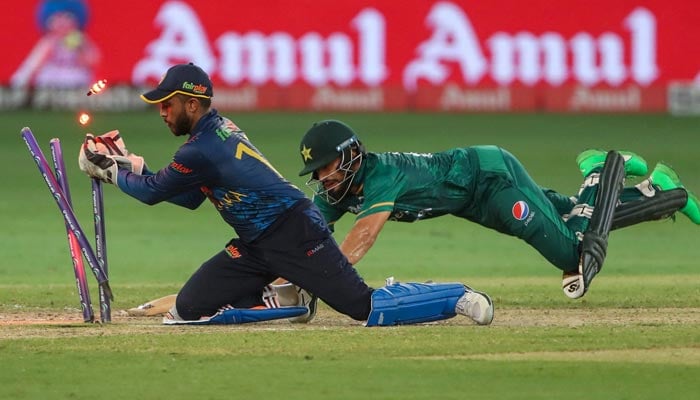A defeat waiting to happen
Winning Pakistani combinations have never been changed since time immemorial and over the years, this has come to acquire the sanctity of a religious edict
September 13, 2022

It is usual to criticise the performance of a Pakistan cricket side after a major defeat, but this is true because we perhaps take the thumb rule of nothing succeeding like success a bit too seriously.
Winning Pakistani combinations have never been changed since time immemorial and over the years, this has come to acquire the sanctity of a religious edict. It is that way of approaching the game that was responsible for the disappointing outcome of the Asia Cup.
The signs that were distinct weak points in this Pakistan lineup were clear even before the tournament started and were reinforced as it progressed. For starters, the opening partnership was not working as it should for this format of the game.
Perhaps because as the two best batters in the side by a mile, Babar and Rizwan had an immense amount of pressure on them; this pressure was heightened as it became evident that Babar was out of form. The two factors combined to create a strategy born out of necessity in which both made very cautious beginnings to Pakistan’s innings in almost every match.
Read more: Sri Lanka beat Pakistan to clinch sixth Asia Cup title
That meant mostly hitting along the ground which is the exact opposite of what the T20 format requires in the opening power play of six overs. Nowhere was it more visible than in the final when not a single aerial shot was attempted in the first six overs, thus completing the first power play some 15-20 runs below par.
That sort of start obviously created a lot of pressure on the middle order which was just not up to the task. So the obvious solution was to open with Fakhar Zaman and Rizwan and let Babar come at number three. Fakhar is a hit-and-miss player and nowadays the occasions he gets going come by less often than Hailey’s comet.
But given that there was no other opener in the squad, that would be a better arrangement simply because the early loss of Fakhar would not have been as damaging psychologically as the early loss of Babar. For some reason that was never tried throughout the tournament.
The middle order trio of Iftikhar, Asif Ali and Khushdil also never made a really meaningful contribution and one is at a loss to understand why this being the case, Haider Ali was not given a chance, especially in the Super 4 game against Sri Lanka which was a dress rehearsal for the final with the added benefit that the result was of no consequence. In fact, he should have been given a chance earlier in the match against Afghanistan.
In pictures: Sri Lankan team receives grand welcome upon return
He just might have come off and given the middle order some semblance of solidity. It is difficult to understand what, if the captain had such little confidence in him even when the rest of the middle order were virtual rabbits, was the point of taking him on the tour. It is inexplicable decisions like these that have perhaps given rise to the stories about Babar having a set of favourites.
Babar Azam has done enough on cricket to justify his claim as Pakistan’s leading batsman. That claim, valid as it undoubtedly is, does not, however, automatically translate to being a top captain.
He seems to have plans which have been previously laid out which are then followed on the field irrespective of the way the game is developing. In any form of the game, more is required of the captain than that. In the final against Sri Lanka, it is difficult to understand why Nawaz, who had been our most economical bowler right through the tournament, was given just one solitary over.
He conceded only three runs in that over but was not called to exert himself at the bowling crease again. Even that one overcame rather late in the Sri Lankan innings when the tide had begun to turn. Iftikhar, who had not bowled in the tournament at all was given preference and although he did well, that should not have excluded Nawaz.
Iftikhar’s effort should have supplemented that of Hasnain who was being tonked around for a bit and instead of his full quota of four overs, Hasnain should have been allowed no more than two at best, especially after Iftikhar had given his captain that cushion.
Read more: Saqlain Mushtaq backs Babar Azam, Mohammad Rizwan after Asia Cup final defeat
Of course, the Sri Lankan fielding was miles superior to that of Pakistan, but it was the batting that lost us in the final. It failed in four out of six matches as a result of which the confidence necessary for a strong batting performance was just not there in the final.
Limited overs cricket is all about strong batting sides and so much of batting is about confidence. It has been some time since Pakistan can boast of such strength. International batting sides are made up of the three batting Ts – talent, temperament and technique.
Without the first T, it is well nigh impossible to have the other two and it is time that the mantra of Pakistan overflowing with talent needs to be seriously re-examined in all disciplines of the game except fast bowling.
— The writer is a former editor of The News, London, and former editor of Cricket Life International, also published from London in the late 1980s, the editor-in-chief of which was Pakistan's former captain and former Prime Minister Imran Khan











